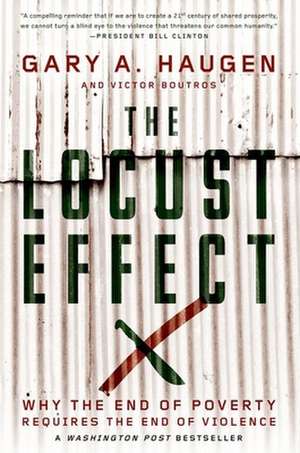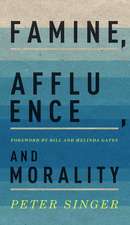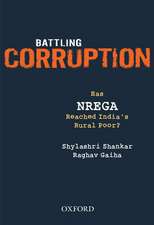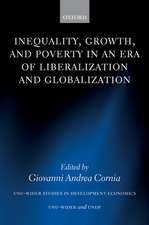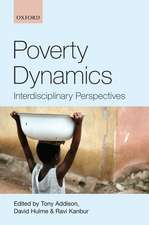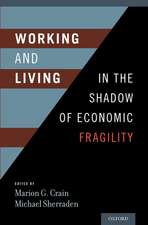The Locust Effect: Why the End of Poverty Requires the End of Violence
Autor Gary A. Haugen, Victor Boutrosen Limba Engleză Paperback – 11 iun 2015
| Toate formatele și edițiile | Preț | Express |
|---|---|---|
| Paperback (1) | 88.16 lei 10-17 zile | |
| Oxford University Press – 11 iun 2015 | 88.16 lei 10-17 zile | |
| Hardback (1) | 127.14 lei 10-17 zile | |
| Oxford University Press – 13 mar 2014 | 127.14 lei 10-17 zile |
Preț: 88.16 lei
Preț vechi: 97.18 lei
-9% Nou
Puncte Express: 132
Preț estimativ în valută:
16.87€ • 17.59$ • 14.02£
16.87€ • 17.59$ • 14.02£
Carte disponibilă
Livrare economică 17-24 februarie
Preluare comenzi: 021 569.72.76
Specificații
ISBN-13: 9780190229269
ISBN-10: 0190229268
Pagini: 384
Ilustrații: illustrations
Dimensiuni: 155 x 231 x 28 mm
Greutate: 0.5 kg
Editura: Oxford University Press
Colecția OUP USA
Locul publicării:New York, United States
ISBN-10: 0190229268
Pagini: 384
Ilustrații: illustrations
Dimensiuni: 155 x 231 x 28 mm
Greutate: 0.5 kg
Editura: Oxford University Press
Colecția OUP USA
Locul publicării:New York, United States
Recenzii
Gripping and perspective-altering book.
Throughout my life I've seen firsthand that while talent, ambition, and hard work are distributed equally among all people around the world, many face challenges each day simply surviving. The Locust Effect is a compelling reminder that if we are to create a 21st century of shared prosperity, we cannot turn a blind eye to the violence that threatens our common humanity.
The Locust Effect provides a much-needed argument for reducing violence against the poor and a demonstration
This extraordinary book offers surprising and valuable insights about the nature and the drivers of the plague of violence that haunts the global poor as well as smart ideas about how to tackle it. A must-read.
You may 'know' that the world's poor suffer common everyday violence - robbery, extortion, rape, murder, torture - a stream of humiliating assaults on their dignity. You may 'know' that this implies lost productivity and ultimately lost growth for low-income economies. Haugen asks why, if we know all that, we do so little? ...Read this book and you will be convinced the issue deserves more of your attention.
Some of the biggest ideas are right in front of us but still invisible. The Locust Effect brings home, in convincing and powerful detail, the simple but oh-so-important point that poverty results from violence as much as violence results from poverty. This book is a must-read for anyone interested in development, security, and the failure of billions of people to achieve their potential.
The Locust Effect presents a compelling and shocking portrayal of the relationship between violence and poverty. The book convincingly argues that violence is the missing link in our understanding of global poverty and of our development interventions. Haugen has spent decades in extraordinary work to address violence, to free those subjected to it, and to apply the rule of law. His firsthand account brings needed moral and developmental urgency to the relentless and pervasive violence poor people experience, especially women and girls. This is a must-read book that will fundamentally expand our analysis of the nature of global poverty and our efforts to overcome it.
In a world of simplistic and knee-jerk responses to the world's problems, Gary Haugen arrives with insight, wisdom, and realism. The Locust Effect is a game-changer. He shows us how violence slices through all our good intentions, negating development, rights, and freedom. This is a book that is as smart as it is heartfelt, as grounded as it is creative. These are ideas of real power and grace.
This crucial study carefully documents the fundamental truth that the end of poverty demands the end of violence. Both fascinating and important, Gary Haugen's book is a moving demonstration that is at once fact-filled and highly readable
The Locust Effect is a wake-up call to everyone who cares about global poverty. As International Justice Mission's Gary Haugen and co-author Victor Boutros report, with painstaking data and breathtaking cases from the field, unchecked violent crime against the poorest, especially girls and women, isn't just a human rights problem. It is a drag on development that no amount of foreign aid can fix if functioning public justice systems aren't part of the solution.
The Locust Effect does a great service to masses of poor and vulnerable children and adults who are victims of everyday, ordinary violent crime but who are wholly unprotected by law enforcement institutions. International Justice Mission and authors Gary Haugen and Victor Boutros have put the life and death issue of poor people's access to the rule of law squarely on the agenda of governments, development institutions, and civil society."
Gary Haugen reveals in painful detail the brokenness of our criminal justice systems. He also shows us that it's possible to fix them. The work of IJM that he narrates from Cebu City in the Philippines, for example, is an extraordinary story of how a committed team can come to understand justice system failures, support improvements at every step in the law enforcement process, strengthen the hand of internal reform champions, and achieve transformation. There are people in every corner of the world working to advance justice. I recommend this book to all of them.
The Locust Effect makes a compelling case that a country that wants to grow and prosper needs a public justice system that protects its people, especially victims of crime, exploitation and oppression. Developing nations that must provide their citizens police who are honest, active and willing to protect victims of crime and exploitation - especially the poorest and most vulnerable in society."
An insightful, incisive analysis of violence as it impacts every level of the plight of the poor. A compelling wake-up call for all who care about justice and human rights. It tells the truth and gives tools and guidelines that demand attention.
I have seen firsthand the ravages of violence against women and children all over the world. International Justice Mission continues to bring to light the impact of common crime not only on individual victims, but on whole countries. The Locust Effect is a must-read book for everybody who cares about the poorest of the poor.
Gary Haugen and IJM are waking up the social consciences of the worldwide Church even as they have shown the international human rights community 'why the end of poverty requires the end of violence' caused by the widespread failure of justice systems in the developing world. In this important book, Haugen continues to do both.
Gary Haugen's The Locust Effect is an exhaustive, devastatingly painful look at the very problem the 'civilized world' would rather not face: the systemic, unspeakable violence against the poorest of the world's poor. This book is hard to read. One wants to turn away. And yet the reader can only wonder what would happen without the profound work of Gary Haugen and International Justice Mission and their tireless efforts to end the madness.
When the bell tolls for justice throughout the modern world, Gary Haugen is most often nearby, raising his voice (and ours) as a tireless sentinel for freedom for the poor and oppressed those who live beyond the reach of the protections many in the western world take for granted day by day. In The Locust Effect, Gary unveils the deeper issues of poverty and uncovers what we often fail to see, or worse, do not want to acknowledge is real.
In a remarkably sensitive study, very aptly named The Locust Effect, the authors have provided many new valuable insights into the intimate relationship between poverty and violence plaguing the billions of global poor in many post-colonial societies across continents. This is also probably the first time that Western observers have come upon the unpleasant reality that it is, in fact, the native political establishments in South Asian countries themselves who stubbornly refuse to break away from the colonial ruler supportive police and criminal justice systems, concepts, laws, procedures, and mind sets imposed by the imperialist rulers, thus denying their peoples the benefits of a citizen friendly law enforcement system. An invaluable companion to all criminal justice studies.
Throughout my life I've seen firsthand that while talent, ambition, and hard work are distributed equally among all people around the world, many face challenges each day simply surviving. The Locust Effect is a compelling reminder that if we are to create a 21st century of shared prosperity, we cannot turn a blind eye to the violence that threatens our common humanity.
The Locust Effect provides a much-needed argument for reducing violence against the poor and a demonstration
This extraordinary book offers surprising and valuable insights about the nature and the drivers of the plague of violence that haunts the global poor as well as smart ideas about how to tackle it. A must-read.
You may 'know' that the world's poor suffer common everyday violence - robbery, extortion, rape, murder, torture - a stream of humiliating assaults on their dignity. You may 'know' that this implies lost productivity and ultimately lost growth for low-income economies. Haugen asks why, if we know all that, we do so little? ...Read this book and you will be convinced the issue deserves more of your attention.
Some of the biggest ideas are right in front of us but still invisible. The Locust Effect brings home, in convincing and powerful detail, the simple but oh-so-important point that poverty results from violence as much as violence results from poverty. This book is a must-read for anyone interested in development, security, and the failure of billions of people to achieve their potential.
The Locust Effect presents a compelling and shocking portrayal of the relationship between violence and poverty. The book convincingly argues that violence is the missing link in our understanding of global poverty and of our development interventions. Haugen has spent decades in extraordinary work to address violence, to free those subjected to it, and to apply the rule of law. His firsthand account brings needed moral and developmental urgency to the relentless and pervasive violence poor people experience, especially women and girls. This is a must-read book that will fundamentally expand our analysis of the nature of global poverty and our efforts to overcome it.
In a world of simplistic and knee-jerk responses to the world's problems, Gary Haugen arrives with insight, wisdom, and realism. The Locust Effect is a game-changer. He shows us how violence slices through all our good intentions, negating development, rights, and freedom. This is a book that is as smart as it is heartfelt, as grounded as it is creative. These are ideas of real power and grace.
This crucial study carefully documents the fundamental truth that the end of poverty demands the end of violence. Both fascinating and important, Gary Haugen's book is a moving demonstration that is at once fact-filled and highly readable
The Locust Effect is a wake-up call to everyone who cares about global poverty. As International Justice Mission's Gary Haugen and co-author Victor Boutros report, with painstaking data and breathtaking cases from the field, unchecked violent crime against the poorest, especially girls and women, isn't just a human rights problem. It is a drag on development that no amount of foreign aid can fix if functioning public justice systems aren't part of the solution.
The Locust Effect does a great service to masses of poor and vulnerable children and adults who are victims of everyday, ordinary violent crime but who are wholly unprotected by law enforcement institutions. International Justice Mission and authors Gary Haugen and Victor Boutros have put the life and death issue of poor people's access to the rule of law squarely on the agenda of governments, development institutions, and civil society."
Gary Haugen reveals in painful detail the brokenness of our criminal justice systems. He also shows us that it's possible to fix them. The work of IJM that he narrates from Cebu City in the Philippines, for example, is an extraordinary story of how a committed team can come to understand justice system failures, support improvements at every step in the law enforcement process, strengthen the hand of internal reform champions, and achieve transformation. There are people in every corner of the world working to advance justice. I recommend this book to all of them.
The Locust Effect makes a compelling case that a country that wants to grow and prosper needs a public justice system that protects its people, especially victims of crime, exploitation and oppression. Developing nations that must provide their citizens police who are honest, active and willing to protect victims of crime and exploitation - especially the poorest and most vulnerable in society."
An insightful, incisive analysis of violence as it impacts every level of the plight of the poor. A compelling wake-up call for all who care about justice and human rights. It tells the truth and gives tools and guidelines that demand attention.
I have seen firsthand the ravages of violence against women and children all over the world. International Justice Mission continues to bring to light the impact of common crime not only on individual victims, but on whole countries. The Locust Effect is a must-read book for everybody who cares about the poorest of the poor.
Gary Haugen and IJM are waking up the social consciences of the worldwide Church even as they have shown the international human rights community 'why the end of poverty requires the end of violence' caused by the widespread failure of justice systems in the developing world. In this important book, Haugen continues to do both.
Gary Haugen's The Locust Effect is an exhaustive, devastatingly painful look at the very problem the 'civilized world' would rather not face: the systemic, unspeakable violence against the poorest of the world's poor. This book is hard to read. One wants to turn away. And yet the reader can only wonder what would happen without the profound work of Gary Haugen and International Justice Mission and their tireless efforts to end the madness.
When the bell tolls for justice throughout the modern world, Gary Haugen is most often nearby, raising his voice (and ours) as a tireless sentinel for freedom for the poor and oppressed those who live beyond the reach of the protections many in the western world take for granted day by day. In The Locust Effect, Gary unveils the deeper issues of poverty and uncovers what we often fail to see, or worse, do not want to acknowledge is real.
In a remarkably sensitive study, very aptly named The Locust Effect, the authors have provided many new valuable insights into the intimate relationship between poverty and violence plaguing the billions of global poor in many post-colonial societies across continents. This is also probably the first time that Western observers have come upon the unpleasant reality that it is, in fact, the native political establishments in South Asian countries themselves who stubbornly refuse to break away from the colonial ruler supportive police and criminal justice systems, concepts, laws, procedures, and mind sets imposed by the imperialist rulers, thus denying their peoples the benefits of a citizen friendly law enforcement system. An invaluable companion to all criminal justice studies.
Notă biografică
Gary A. Haugen is founder and president of International Justice Mission, a global human rights agency that protects the poor from violence. The largest organization of its kind, IJM has partnered with law enforcement to rescue thousands of victims of violence. Haugen was Director of the U.N. investigation in the aftermath of the Rwandan genocide, and has been recognized by the U.S. State Department as a Trafficking in Persons "Hero^" -- the U.S. government's highest honor for anti-slavery leadership.Victor Boutros is a federal prosecutor who investigates and tries nationally significant cases of police misconduct, hate crimes, and international human trafficking around the country on behalf of the U.S. Department of Justice. He is also a member of the Justice Department's Human Trafficking Prosecution Unit, which consolidates the expertise of some of nation's top human trafficking prosecutors and enhances the federal government's ability to identify and prosecute large human trafficking networks.
